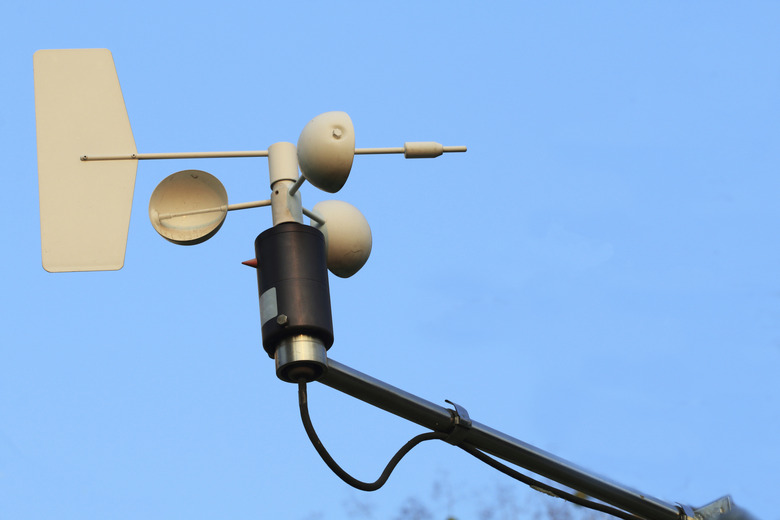How To Calculate A Wind Chill Factor
During a weather report in the middle of a blustery winter, a meteorologist will often mention wind chill factor along with the high and low temperatures of the day. Wind chill factor gives a sense of how the weather feels versus the actual temperature. When the temperature drops near freezing, it is possible that a low wind chill factor could make the air feel below freezing.
Wind Chill Factor: Purpose
Wind
Chill Factor: Purpose
Wind chill factor was designed for a limited purpose. It measures heat loss from exposed areas of the human body, like hands and face, in low temperatures and measured wind speeds.
With this information, people venturing outside in exceptionally bitter weather would know an approximate time before exposed areas of the body would succumb to frostbite.
Wind chill factors are useful for temperatures at or below 50 degrees Fahrenheit and wind speeds above 3 miles per hour, though the subjectivity of how the weather "feels" makes wind chill factor an often disputed measurement tool.
History of the Wind Chill Factor
History
of the Wind Chill Factor
In the 1940s, two American scientists, Paul Siple and Charles Passel, were stationed in Antarctica. Siple and Passel were measuring the effect of how wind blowing can cause an object to lose heat at a quicker rate. The scientists placed water bottles out in the elements and studied the freezing rates in varying wind speeds and temperatures.
The scientists measured the wind chill factor in kilocalories per hour per square meter, a confusing measurement for anyone outside their field. In the 1960s, the United States military sought to express the measurement in terms of temperature.
By the 1970s, wind chill equivalent temperatures were a common feature of weather reports. However, the calculated wind chill factor was not always accurate. Canadian scientist Randall Osczevski reformatted the wind chill factor formula in 2001 with modern models of heat loss from the human body.
Wind Chill Formula
Wind Chill Formula
The new formula for wind chill factor was developed partly by experiment. Human subjects were wired for heat temperature loss as they walked in a cold wind tunnel.
Wind chill formula in English units of measurement:
Wind chill = 35.74 + 0.6215T – 35.75 (V^0.16) + 0.4275T (V^0.16)
- T
= Temperature in degrees Fahrenheit
- V
= Wind velocity in miles per hour
If using metric, the wind chill formula is:
Wind chill = 13.12 + 0.6215T – 11.37 (V^0.16) + 0.3965T (V^0.16)
- T
= Temperature in degrees Celsius
- V
= Wind velocity in kilometers per hour
Wind Chill Factor: Example
Wind Chill Factor: Example
To calculate wind chill factor, it requires an anemometer, an instrument for measuring the speed of the wind, and a thermometer. Once readings are made, place the values of V and T into the correct formula.
**Example:** Calculate wind chill factor for a temperature of minus 20 degrees Fahrenheit and a wind speed of 55 miles per hour.
Use the Fahrenheit and miles per hour wind chill formula:
Wind chill = 35.74 + 0.6215T – 35.75 (V^0.16) + 0.4275T (V^0.16)
Place the values in for T and V where W (T, V) is the wind chill factor at a particular temperature and wind speed:
W (T, V) = 35.74 + 0.6215(–20) – 35.75 (55^0.16) + 0.4275(–20) (55^0.16)
Simplify:
- W (T, V) = 35.74 –12.43 – 35.75 (1.90) –8.55 (1.90)
- W (T, V) = 35.74 –12.43 – 67.93 – 16.25 = 60.87
The wind chill factor is 61 below zero.
Wind Chill Table and Calculators
Wind Chill Table and Calculators
Wind chill tables and calculators exist on the internet; refer to the Resources section for examples. Note that charts will outline how many minutes before frostbite can occur.
For example, at 0 degrees Fahrenheit with a wind chill factor of 30 miles per hour, the frostbite time is 30 minutes. If the wind picks up to 60 miles an hour at 0 degrees Fahrenheit, the frostbite time drops to 10 minutes.
Cite This Article
MLA
Kozlowski, Rosann. "How To Calculate A Wind Chill Factor" sciencing.com, https://www.sciencing.com/calculate-wind-chill-factor-5981683/. 30 March 2020.
APA
Kozlowski, Rosann. (2020, March 30). How To Calculate A Wind Chill Factor. sciencing.com. Retrieved from https://www.sciencing.com/calculate-wind-chill-factor-5981683/
Chicago
Kozlowski, Rosann. How To Calculate A Wind Chill Factor last modified March 24, 2022. https://www.sciencing.com/calculate-wind-chill-factor-5981683/
